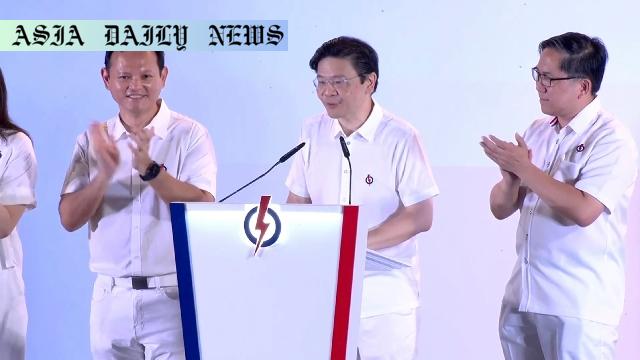Singapore election ensures People’s Action Party’s unbroken 60-year rule with a resounding 87 out of 97 seats victory.
Singapore election results grant PAP a dominant victory with 87 seats.
People’s Action Party secures 65.5% of total popular votes.
Prime Minister Lawrence Wong expresses his gratitude for strong voter support.
This victory guarantees PAP’s unbroken 60-year leadership since 1965.
Rising living costs were addressed via cash vouchers and policy appeals.

Introduction: A Historic Victory for PAP
Singapore’s ruling People’s Action Party (PAP) has once again reaffirmed its dominance in the political landscape, clinching a landslide victory in the nation’s latest general election. Winning 87 out of 97 parliamentary seats and garnering 65.5% of the popular vote, this win solidifies PAP’s unbroken rule of 60 years since Singapore achieved independence in 1965. The election results not only underscore the party’s continued popularity but also reflect the challenges and successes of governance in a rapidly evolving socio-economic context.
Prime Minister Lawrence Wong’s Leadership and Mandate
Prime Minister Lawrence Wong, who recently took office, described the victory as a strong endorsement of his party’s governance. In his victory speech, Wong pledged to honor the trust placed in him and his party by prioritizing the welfare of all Singaporeans. The election marked Wong’s first major test in leadership post-transition, and the results signify a broad confidence in his approach to tackling key issues such as economic stability, housing affordability, and cost-of-living concerns. His emphasis on maintaining stability during global economic uncertainties resonated well with voters.
Policy Measures and Public Support
PAP’s electoral strategy revolved around offering pragmatic solutions to rising living costs. Cash vouchers for citizens aged 21 and above were distributed as part of relief measures aimed at easing financial burdens caused by inflation and global trade disruptions. Additionally, the party’s campaign message emphasized the importance of a stable government in navigating external pressures such as US-China trade tensions. These efforts likely contributed to the party’s ability to retain widespread support, as evidenced by the significant increase in popular vote percentage.
The Significance of a Stable Leadership
The victory reflects the electorate’s preference for continuity and stability amidst a volatile global environment. The PAP’s long-standing governance has established Singapore as a global hub for finance, technology, and trade. While critics argue that the one-party dominance limits political diversity, supporters assert that such continuity fosters consistent policies and steady progress. The party’s ability to adapt to changing times while maintaining its core principles remains a critical factor in its sustained success.
Opposition’s Position and Future Challenges
Despite the overwhelming dominance of PAP, the opposition managed to secure 10 seats, representing a growing voice of dissent within the electorate. The larger popular vote margin indicates PAP’s stronghold, but the opposition’s steady representation in Parliament reflects an evolving political landscape. Challenges such as addressing income inequality, providing affordable housing, and balancing economic growth with environmental sustainability will test PAP’s governance in the coming years. Effective handling of these issues could solidify their legacy further, while lapses might provide opposition parties with leverage in future elections.
Conclusion
Singapore’s latest general election not only underscores PAP’s unyielding grip on power but also marks significant milestones for the country’s political and socio-economic trajectory. While Prime Minister Lawrence Wong’s leadership appears secure for now, the real test will lie in addressing pressing domestic and global challenges. As Singapore continues its journey of growth and modernization, the electorate’s trust in PAP’s vision remains steadfast, offering a mandate for stability, progress, and innovation in the years to come.
Commentary
PAP’s Historic Victory: What It Means for Singapore
Singapore’s recent general election results speak volumes about the electorate’s unwavering trust in the People’s Action Party (PAP). As they clinch yet another landslide victory with an impressive 87 out of 97 seats, the significance of this outcome cannot be understated. It is a testament to PAP’s decades-long governance model that continues to resonate with the citizenry, providing a sense of stability and reliability in tumultuous times.
Prime Minister Wong: Rising to the Challenge
Prime Minister Lawrence Wong’s leadership played a pivotal role in this electoral outcome. Coming into power just last year, Wong had the challenging task of maintaining PAP’s legacy while crafting his own distinctive narrative. The resounding victory serves as a strong vote of confidence in his leadership. However, it also places significant responsibility on his shoulders to deliver on promises and address pressing issues like rising living costs and economic uncertainties. His acknowledgment of this trust in his victory speech reflects a leader who understands the weight of expectations.
The Broader Implications for Singapore
The election underscores Singapore’s preference for continuity during global headwinds, ranging from trade friction between major economies to rising inflation. At the same time, it highlights the electorate’s faith in PAP’s ability to navigate challenges effectively. However, this unbroken dominance raises questions about political diversity within Singapore. While PAP’s governance has undoubtedly transformed Singapore into a global economic hub, fostering greater political dialogue and opposition representation could be key to tackling emerging socio-political complexities.
Looking Forward
As Singapore moves forward, the challenges ahead will require innovative solutions and collaborative governance. While PAP’s victory signals strong public support, it must not be mistaken for complacency. Issues such as income inequality, housing affordability, and the country’s environmental priorities will need immediate attention. Prime Minister Wong and his team are well-positioned to leverage this mandate to address these concerns effectively. Ultimately, the continuation of PAP’s leadership story depends on their ability to balance progress with inclusivity and sustainability.


